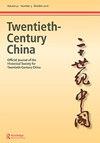World History and National Identity in China: The Twentieth Century by Xin Fan (review)
IF 0.4
Q1 HISTORY
引用次数: 0
Abstract
The study of the politics and intellectual stakes of historical production has long been an important subfield in modern China studies. Xin Fan’s World History and National Identity in China is a valuable and unique addition to this literature. On the one hand, it shares the approach of recent studies in focusing not only on the politics of historical writing but also on the structural changes in the education system, the formation of academic disciplines, and the rise of modern print culture.1 On the other hand, this book spans the entire twentieth century and places its emphasis not on the historiography of China but on the development of world history (世界史 shijie shi) as an academic field from the late Qing to contemporary China. Furthermore, in using sources such as autobiographies, correspondence, and, importantly, archived personnel files and declassified secret reports, it sheds empathetic light on the “agency of non-Western world historians in writing history based on the lived experiences of some of the most significant Chinese world historians” (10). In the opening chapter, Fan locates the origins of modern Chinese world-historical writing in the late Qing, connecting long-standing Neo-Confucian and statecraft interests in compiling geographical knowledge of foreign realms to recent changes in the New Policies period under a reformed education system. This shift is evidenced in the work of Zhou Weihan (周维翰 1870–1910), a Changzhou scholar and physician, whose An Outline of Western History (西史綱目 Xishi gangmu), published in 1901 through the translation-oriented Shanghai press Jingshi wenshe (經世文社), represented a new temporally focused approach to world history. Instead of idealizing past epochs such as the Three Dynasties period like many other late Qing intellectuals, Zhou applied universal categories to his comparative analysis of ancient European and Chinese societies, while he held onto Confucian notions such as human nature (性 xing) in an “attempt to embrace the belief in a common humanity in overcoming the differences between the East and West” (48). For Fan, Zhou’s seemingly cosmopolitan approach would serve as both a standard and a challenge for later generations of Chinese scholars whose study of world history proceeded under vastly different professional and political circumstances. Professionalization, print capitalism, and the shifting priorities of Republican and wartime China serve as the context of chapter 2. Here, Fan focuses on Western-educated “returned students” who became university professors and practicing world historians. Although Chen Hengzhe (陳衡哲 1893–1976), who was notably the only renowned woman世界历史与中国的民族认同:辛凡《二十世纪》(综述)
历史生产的政治和智力利害关系研究长期以来一直是中国现代研究的一个重要分支领域。辛凡的《世界历史与中国民族认同》是对这部文学的一个宝贵而独特的补充。一方面,它与最近的研究方法相同,不仅关注历史写作的政治性,而且关注教育体系的结构变化、学术学科的形成和现代印刷文化的兴起。1另一方面,这本书跨越了整个二十世纪,它强调的不是中国的史学,而是世界历史的发展(世界史 史介石)作为一个从晚清到当代中国的学术领域。此外,通过使用自传、信件等来源,更重要的是,通过使用存档的人事档案和解密的秘密报告,它对“非西方世界历史学家根据一些最重要的中国世界历史学家的生活经历撰写历史的能动性”(10)提供了同情。在第一章中,范定位了晚清中国现代世界历史写作的起源,将长期以来新儒家和治国理学在编纂外国地理知识方面的兴趣与改革后的教育制度下新政时期的近期变化联系起来。周维汉的工作证明了这种转变(周维翰 1870-1910),常州学者、医师,著有《西洋史纲》(西史綱目 西施刚穆),1901年由上海译文出版社出版(經世文社), 代表了一种新的以时间为中心的世界历史方法。周没有像其他晚清知识分子那样理想化过去的时代,如三代时期,而是将普遍范畴应用于他对古代欧洲和中国社会的比较分析,同时他坚持儒家的人性观(性 邢)“试图在克服东西方差异的过程中接受共同人性的信念”(48)。对范来说,周看似国际化的方法将成为中国后世学者的标准和挑战,他们对世界史的研究是在截然不同的专业和政治环境下进行的。专业化、印刷资本主义以及共和党和战时中国优先事项的转变是第二章的背景。在这里,范关注的是受过西方教育的“留学生”,他们成为了大学教授和世界历史学家。虽然陈衡哲(陳衡哲 1893-1976),她是唯一著名的女性
本文章由计算机程序翻译,如有差异,请以英文原文为准。
求助全文
约1分钟内获得全文
求助全文

 求助内容:
求助内容: 应助结果提醒方式:
应助结果提醒方式:


